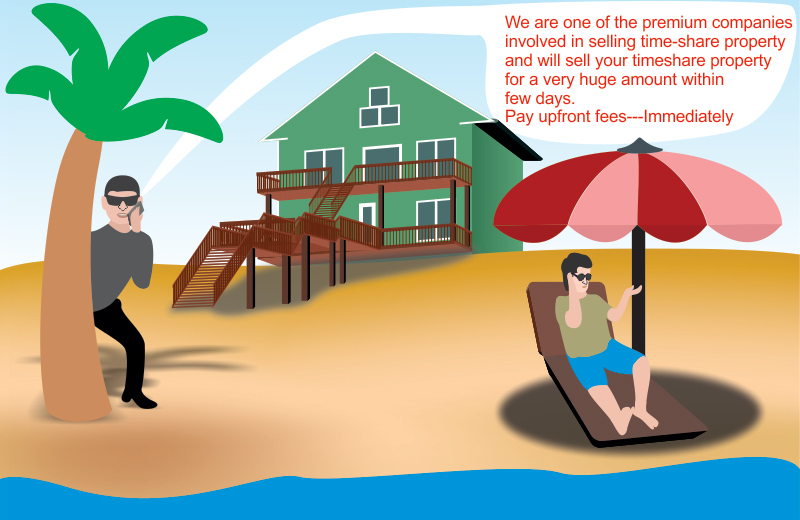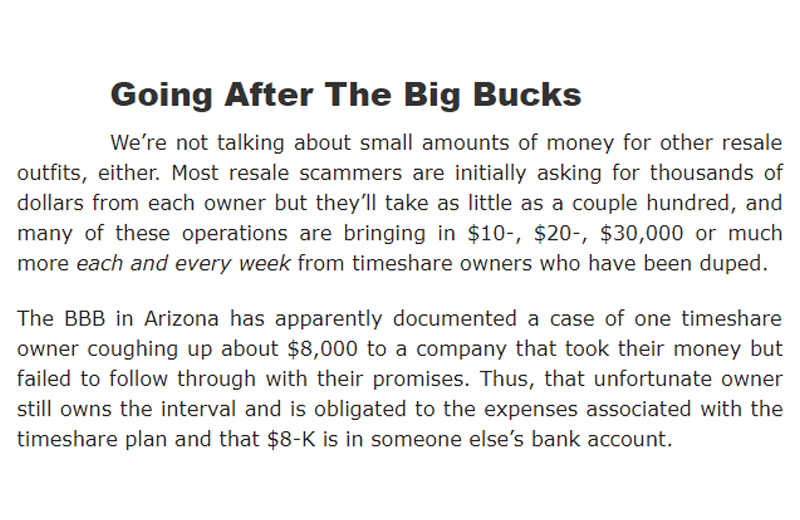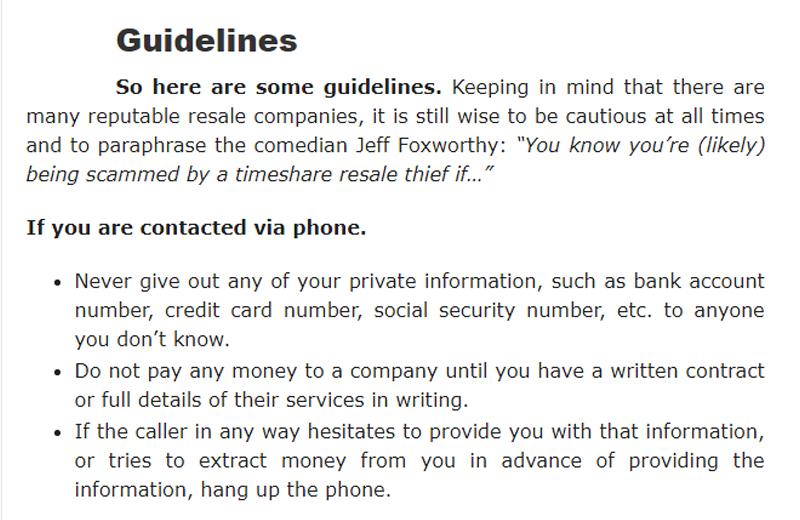Scams
» Scam
And Its Types » Timeshare Scams
Timeshare Scams
Timeshare scams are a type of fraud that plays on people's dreams of owning a vacation home without the full expense or hassle of outright property ownership. Imagine having a slice of paradise that you could visit every year; that's the appealing promise of a timeshare. However, not all that glitters is gold, and the timeshare market has its dark corners, rife with timeshare scams. Police authorities and other governmental authorities are trying their level best to get a tipoff to find the locality or address of the cyber criminals and scammers. Jackpot fixing scandal is becoming famous in the United States. One of the scandals that made the world sit and watch was the power-ball scandal that rocked US where a Multi-State Lottery Association security expert was convicted fraud and sentenced to ten years imprisonment. This guy was able to secure the winning ticket through self-destructing software. These types of lottery scams are becoming popular
and thousands of people have lost their money in buying lottery tickets. Scams related to time share is becoming extremely famous. Few years back Lauderdale Police Department arrested around thirteen fraudsters those who were involved in timeshare scams. These guys were working as telemarketing executives in a company named Florida timeshare Resale Company. They were involved in massive telemarketing scam. Timeshare is a concept where the several owners will share a lavish property or a resort. These timeshare property owners will sell their share of property through intermediaries. Scammers will pose as an affluent and branded intermediary and charge extraordinary upfront fees from the timeshare owner those are selling their share. Police department is seeing increasing number of timeshare frauds and scams and also order few telemarketing companies to close their shutters.
Timeshare properties are promoted and looked after by the companies that are selling them to different buyers. Tele-callers or few staff of the promoting companies will themselves act as fraudsters and scammers and will swindle the property owners' money. Scammers will come out with wonderful techniques in timeshare scams. They will shoot hundreds of mails to the timeshare property owners with the following wordings "We are one of the premium companies involved in selling time-share property and will sell your timeshare property for a very huge amount within few days. If you are interested please reply to this mail with an upfront fees of ---immediately", Hundreds of people those who owned timeshare property have fallen prey to these words and lost their money.
But scammers generally prefer phones as a preferred medium of communication. Scams related to timeshare elimination are also gaining popularity. Customers owning timeshare property will suddenly get a call from the scammers stating that they are timeshare elimination experts and you can easily exit from the timeshare by paying nominal upfront fees or they will also state that they are buying the property immediately and request the owner to pay processing fees. Scams related to time share presentation is worth reading and jotting down. In these types of scams the scammer or fraudster will approach the public as timeshare salesman and show lots of presentations about the methods followed in timeshare. He will inform that many resorts are offering timeshared rooms and for availing this facility they should give him immediately several dollars for processing. Many people have fallen prey to these types of scammers and have lost their money. Scams related to timeshare complaint and resale is also becoming famous. Public should never reply to the mails of the scammers and if they get a call from these types of people should immediately disconnect.
But scammers generally prefer phones as a preferred medium of communication. Scams related to timeshare elimination are also gaining popularity. Customers owning timeshare property will suddenly get a call from the scammers stating that they are timeshare elimination experts and you can easily exit from the timeshare by paying nominal upfront fees or they will also state that they are buying the property immediately and request the owner to pay processing fees. Scams related to time share presentation is worth reading and jotting down. In these types of scams the scammer or fraudster will approach the public as timeshare salesman and show lots of presentations about the methods followed in timeshare. He will inform that many resorts are offering timeshared rooms and for availing this facility they should give him immediately several dollars for processing. Many people have fallen prey to these types of scammers and have lost their money. Scams related to timeshare complaint and resale is also becoming famous. Public should never reply to the mails of the scammers and if they get a call from these types of people should immediately disconnect.
Here's how the scam often unfolds, in plain human language:
The Dream Sale
It starts with an irresistible offer: a free stay at a luxurious resort, discounted travel, or a gift card. The only catch? You have to attend a sales presentation. This is where the dream of affordable luxury vacations is sold. The sales pitch is high-pressure, highly persuasive, and often stretches the truth about the benefits of owning a timeshare, setting the stage for a timeshare scam.
The Hidden Costs
Once you're hooked, the reality sets in. Maintenance fees, management fees, and other hidden costs start to pile up, year after year. These fees can increase at any time, and you're contractually obligated to pay them, whether you use your timeshare or not. Selling your timeshare can be difficult, too, since the market is often saturated with more sellers than buyers, a situation ripe for timeshare scams.
Here's an illustration that captures the essence of a timeshare scam, featuring a deceptive salesman presenting to an unsuspecting couple. The image aims to convey the misleading allure and hidden pitfalls associated with such scams.
The Exit Trap
If you decide that timeshare ownership isn't for you, exiting your contract can be a nightmare. This is where the second layer of timeshare scams comes in. Companies might approach you with promises to sell your timeshare or get you out of your contract for an upfront fee. Sadly, many of these offers are fraudulent, leaving owners out of pocket and still stuck with their timeshare.
Red Flags and Protection
To avoid falling victim to timeshare scams, watch out for red flags such as:
- High-pressure sales tactics that rush you into making a decision.
- Promises that sound too good to be true, like guaranteed rental income or skyrocketing property values.
- Requests for upfront fees for selling or exiting your timeshare.
The best defense is to research thoroughly, take your time making a decision, and consult with a legal professional before signing any contract related to timeshares.
Here are ten key points about timeshare scams:
- High Pressure Sales Tactics: Timeshare scams often start with high-pressure sales presentations where potential buyers are offered free gifts, vacations, or other incentives to attend. During these sessions, salespeople may use aggressive tactics to convince attendees to purchase timeshares without giving them adequate time to consider the decision or review the contract details.
- Misrepresentation of Benefits: Scammers may exaggerate the benefits of owning a timeshare, such as claiming it's a great investment or easy to exchange and rent. They often downplay the costs associated with maintenance fees, taxes, and difficulty in booking the desired times.
- Upfront Fees for Selling or Renting: Owners trying to sell or rent their timeshare may encounter scams where companies claim they have a buyer or renter ready but require an upfront fee to proceed. Often, once the fee is paid, the promised buyer or renter disappears, and the time share remains unsold or unrented.
- Transfer Scams: Some scammers offer to take over ownership of unwanted timeshares, claiming to relieve owners of their annual maintenance fees. They may require an upfront fee for this service, but once paid, they disappear, and the original owner remains responsible for the time share.
- Fake Resale Companies: Scammers might set up fake companies claiming to specialize in timeshare resales. They often create professional-looking websites and marketing materials to appear legitimate but are only interested in collecting fees from sellers without providing any real services.
- False Rental Promises: Owners may be approached by companies promising to rent out their timeshare for a significant profit. After paying an upfront fee for advertising or other services, the owner finds that the company does not deliver any rental offers.
- Timeshare Exit Scams: Some scammers target owners who are desperate to exit their timeshare commitments, offering legal or negotiation services to free them from their contracts for a hefty fee. Unfortunately, these scammers often fail to provide the promised services.
- Phishing and Identity Theft: Scammers may pose as legitimate timeshare buyers or sellers to phish for personal and financial information, leading to identity theft and financial fraud.
- Fake Listings and Websites: Scammers create fake listings or entire websites offering timeshares in desirable locations at too-good-to-be-true prices. They use these listings to collect deposits or fees from unsuspecting victims.
- Legal and Financial Implications: Victims of timeshare scams can face significant legal and financial repercussions, including loss of money, damage to credit scores, and legal obligations to time share contracts that are difficult or impossible to cancel.
In Summary
Timeshare scams exploit the desire for affordable vacation homes, entangling people in contracts that are costly and hard to escape. While not all timeshare opportunities are scams, it's crucial to approach these investments with caution, armed with knowledge and skepticism. Remember, when it comes to timeshares, if it seems too perfect, it might just be a timeshare scam in disguise.








